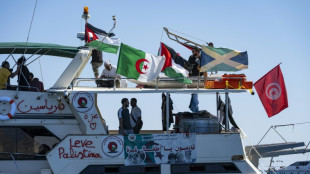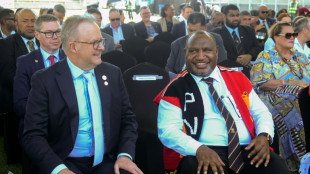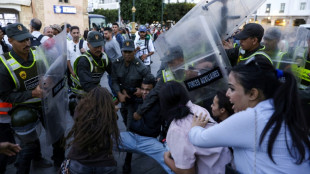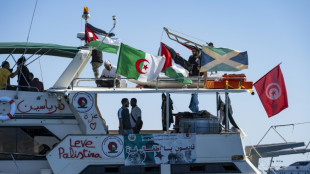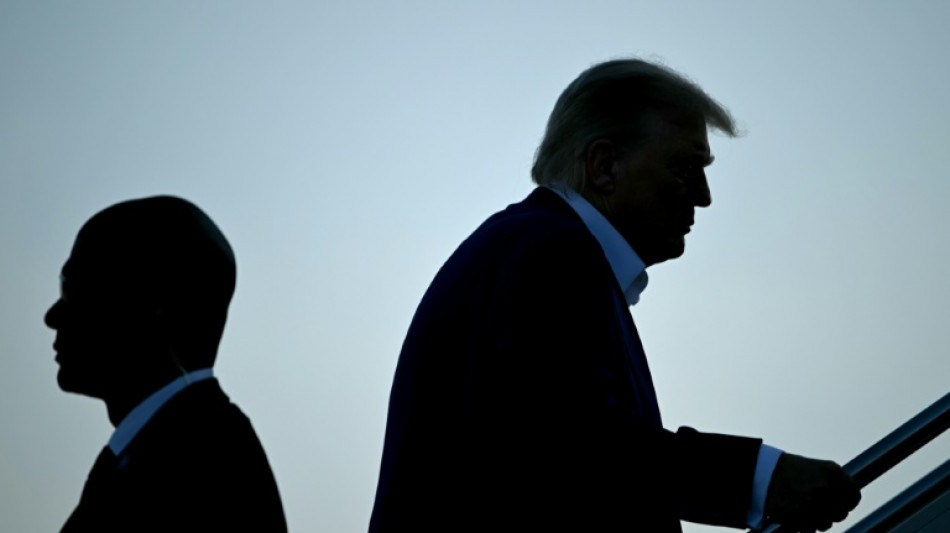
Trump sows doubt on defending allies ahead of NATO summit

US President Donald Trump cast doubt on his commitment to protect Europe as he headed Tuesday to a NATO summit to get allies to pledge more defence spending, after rounding on Israel and Iran for breaching a truce.
The overriding goal of NATO's two-day gathering, which kicks off with dinner hosted by the Dutch king, is make Trump happy after his return to power sparked fears he could blow a hole in the seven-decade-old alliance.
The volatile leader appeared in an angry mood as he fumed at Israel and Iran before departing Washington.
NATO hopes to keep Trump bound to the alliance's mutual defence vow by meeting his demand for a headline figure of five percent of GDP on defence spending.
But Trump refused to say he was committed to NATO's Article Five clause and protecting Europe in a move that will likely rattle his counterparts on the continent.
"Depends on your definition. There's numerous definitions of Article Five," Trump told journalists aboard Air Force One. "I'm committed to being their friends."
To keep Trump on board, NATO's 32 countries have thrashed out a compromise deal to dedicate 3.5 percent to core military needs by 2035, and 1.5 percent to broader security-related areas such as cybersecurity and infrastructure.
NATO says the military build-up is crucial to deter Russia, which officials warn is rapidly rebuilding its forces depleted by the war in Ukraine and could be ready to attack the alliance in five years.
But it is just as important for keeping Trump engaged as Washington warns it may shift forces from Europe to face the threat from China.
"They're going to be lifting it to five percent, that's good," Trump said. "It gives them much more power."
But while the promise of more spending could win Trump over, deep divisions remain over the approach to Europe's key security issue: Russia's war in Ukraine.
Trump said he would probably meet Ukraine's President Volodymyr Zelensky while in The Hague, with Kyiv hoping it can avoid a repeat of the pair's infamous Oval Office bust-up.
- 'Radical uncertainty' -
European Commission chief Ursula von der Leyen told an audience in The Hague that NATO's "historic" spending pledge showed that "the Europe of defence has finally awakened".
Alliance leaders meanwhile -- many of whom are struggling to find the money that will be required -- lined up to argue that the threats facing the continent required bold steps.
"We must navigate this era of radical uncertainty with agility," British Prime Minister Keir Starmer said Monday in announcing the UK's commitment to meet the target.
In a joint Financial Times op-ed on the summit's eve, French President Emmanuel Macron and German Chancellor Friedrich Merz said Europe must rearm "not because someone asks us to, but because we are clear-eyed and owe it to our citizens to do so".
Powerhouse Germany announced plans to hit the 3.5-percent figure for core defence needs by 2029 -- six years before the timeline.
For its part, the Kremlin attacked NATO for its "rampant militarisation", with spokesman Dmitry Peskov saying: "This is the reality that surrounds us."
- Trump-Zelensky meeting -
Since storming back to power, Trump has upended the West's approach to the three-year conflict by turning his back on Kyiv and opening the door to closer ties with Moscow.
Zelensky was set to play less of a central role than at recent NATO gatherings and will not attend the main working session.
But Ukraine's presidency said he would discuss with Trump buying a package of weapons made up mainly of air defences.
Zelensky would also push Trump on imposing new sanctions on Russia as Moscow has stalled peace efforts being pressed by Washington, Kyiv said.
"There are no signs that Putin wants to stop this war. Russia rejects all peace proposals including those from the US. Putin only thinks about war," the Ukrainian leader told a defence forum held alongside the summit.
Rutte said allies would send the message that support for Kyiv was "unwavering and will persist".
But despite his insistence that Ukraine's bid for membership remains "irreversible", NATO will avoid any mention of Kyiv's push to join after Trump ruled it out.
D.Campanella--INP

 London
London

 Manchester
Manchester
 Glasgow
Glasgow
 Dublin
Dublin
 Belfast
Belfast
 Washington
Washington
 Denver
Denver
 Atlanta
Atlanta
 Dallas
Dallas
 Houston Texas
Houston Texas
 New Orleans
New Orleans
 El Paso
El Paso
 Phoenix
Phoenix
 Los Angeles
Los Angeles
